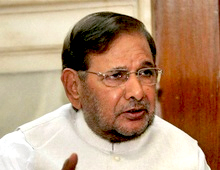 New Delhi, Jun 14: JD (U), a key constituent of NDA, on Friday voiced concern over the Opposition alliance "deviating" from its national agenda but said it has not given any ultimatum to BJP over walking out of the coalition.
New Delhi, Jun 14: JD (U), a key constituent of NDA, on Friday voiced concern over the Opposition alliance "deviating" from its national agenda but said it has not given any ultimatum to BJP over walking out of the coalition.
"The alliance of NDA exists for now but the alliance has to continue under the norms of national agenda of NDA under which the coalition has functioned so far," JD (U) president and NDA convenor Sharad Yadav told reporters.
He said certain events had taken place which went against the tenets of NDA's national agenda.
The relations between JD (U) and BJP have been strained following the appointment of Gujarat chief minister Narendra Modi as the chairman of the BJP's campaign committee chief for next Lok Sabha polls.
Yadav said that JD (U) had maintained that Modi's elevation was an internal matter of BJP.
"But we have objections to the remarks made by BJP leaders after that. At Goa, speeches that happened went beyond the national agenda," he said.
Meanwhile, CPI (M) leader Sitaram Yechury also met Yadav to discuss the political situation in the country. BJP leader Rajiv Pratap Rudy has said that both JD (U) and BJP needed Modi.
"It is wrong to say that we have given BJP any ultimatum. That report is wrong. We are definitely concerned over the sequence of events in BJP in last few days," Yadav said, adding that these and other issues would be discussed at a two-day party meeting beginning tomorrow.
Asked about a rapprochement with BJP, he said, "Why not? Options are still not closed."
Yadav refused to talk about the possibility of a 'Federal Front' mooted by West Bengal chief minister Mamata Banerjee.
"The question does not arise now. NDA still exists. Where has NDA broken up that you are talking of a Third Front," he said.
Asked about JD (U) majority in Bihar, Yadav said, "Where has the alliance broken up now that you are talking about all this".






Comments
Add new comment